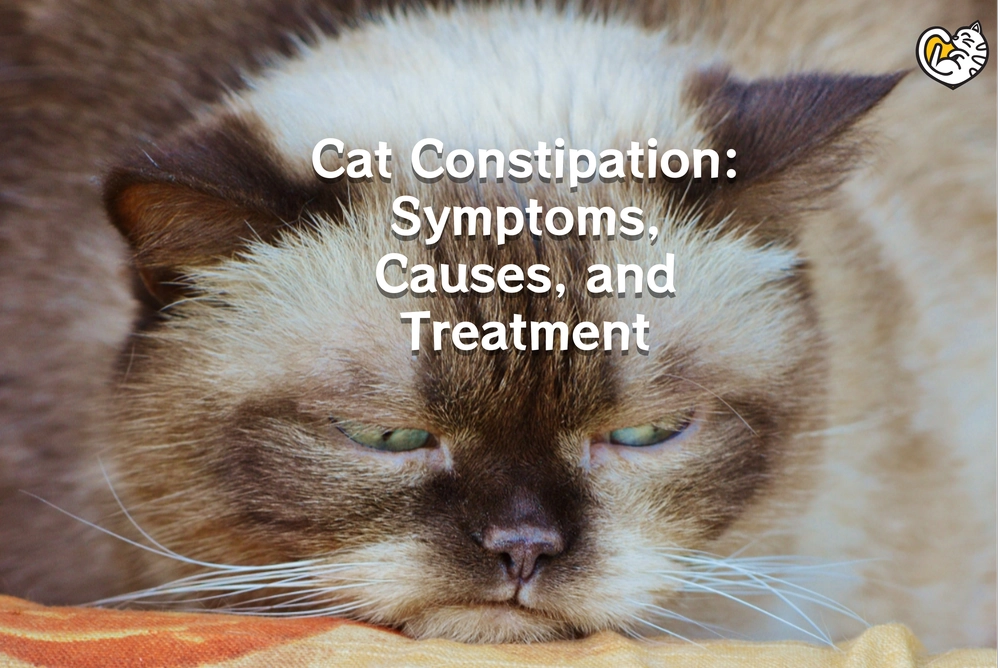Cat Constipation: Symptoms, Causes, Treatment, and Recovery


Cats, like humans, can indeed experience constipation, characterized by difficulty in defecating. The causes of constipation in cats are diverse, ranging from hairballs to kidney disease.
Here's an overview of constipation in cats, covering causes, symptoms, and treatment options.
Is Your Cat Picky About Food?
Well, my cats used to be like that too, but now they finished the food all the time!
If your cat doesn’t want to eat the food or finish the food you gave, I have a solution for you. Read my true story here.
What Is Cat Constipation?
Constipation occurs when your cat experiences infrequent or difficult bowel movements. This can result in hard, uncomfortable stools, or in severe cases, no bowel movements at all.
It's crucial to recognize that cat constipation is typically a short-term issue. However, if it persists, it may progress to obstipation, characterized by painful defecation, or even megacolon, an advanced stage of chronic constipation that often doesn't respond well to medical interventions.
If you notice your cat straining in the litter box, it's essential to consult with a vet promptly. The underlying cause could be potentially serious or even life-threatening if left untreated. Prioritize your cat's well-being by seeking professional veterinary advice in such situations.
Symptoms of Cat Constipation
Cat constipation can manifest through various symptoms. Look out for the following signs:
- Limited or no production of feces during attempts to defecate.
- Increased frequency of visits to the litter box.
- Episodes of vomiting.
- Reduced appetite.
- Signs of abdominal pain.
- Decreased energy levels.
- Diminished interest in interacting with the family.
If you observe these symptoms in your cat, it's advisable to consult with a veterinarian promptly. Timely intervention can address the underlying issue and improve your cat's overall well-being.
Causes of Cat Constipation
Cat constipation can result from various causes, ranging from environmental factors to underlying health issues. It's crucial to consult with a vet within 24 hours to rule out health-related causes or potential diseases.
- Litter Box Issues: Cat constipation may begin with problems related to the litter box. Ensure the box is clean, easily accessible, and not associated with scary noises. Consider:
- Placing it in a quiet location away from disturbances.
- Moving it away from your cat's eating, drinking, and resting areas.
- Regularly cleaning to reduce odors.
- Switching to a low-sided box for easier access.
- Not Drinking Enough: Insufficient water intake could contribute to constipation. Rule out health concerns and consider:
- Using a cat water fountain for flowing water.
- Trying different materials for water bowls.
- Keeping the water bowl clean.
- Hairballs: Especially in longhaired cats.
- Underlying Disease: Various diseases, both short-term and chronic, can lead to constipation. Conditions like kidney disease, diabetes, and hyperthyroidism should be evaluated by a vet promptly.
- Pelvic Injuries: Resulting in a narrowed pelvic canal.
- Obstruction: An obstruction, such as a toy or non-food item, can be a critical emergency. If your cat is constipated and shows symptoms of obstruction like vomiting, lethargy, or a swollen belly, seek immediate veterinary attention.
- Not Enough Exercise: Inactivity can contribute to constipation. Ensure your cat gets 10-15 minutes of interactive play daily. Consider:
- Providing cat trees for climbing.
- Offering scratching posts for natural behavior.
- Using toys that mimic prey animals.
- Introducing smart toys that encourage hunting and chasing.
- Using catnip to enhance the enjoyment of these activities.
Remember, any signs of straining in the litter box warrant prompt veterinary evaluation, as these issues can escalate and pose serious threats if left untreated.
In some instances, constipation arises without an obvious cause, and it can be a symptom of idiopathic (unknown cause) megacolon. Prioritize your cat's health and well-being by seeking professional advice.
What is Megacolon?
Megacolon refers to a dilated and weak colon causing severe constipation, often the most common cause in cats. Weak muscles in the colon fail to propel fecal matter effectively, possibly due to neurological issues, muscular problems, or a combination of both.
Megacolon may be primary or secondary, developing after prolonged constipation. When the colon becomes distended over time, its ability to contract may diminish, leading to megacolon. Fecal accumulation occurs in the abnormally enlarged colon. For more details on megacolon, refer to the "Megacolon in Cats" handout.
How Vets Diagnose Cat Constipation
When diagnosing cat constipation, veterinarians follow a structured approach:
- History Gathering: You'll provide details on symptoms, onset, and relevant factors. A thorough history is vital as litter box straining may also indicate urinary issues or diarrhea.
- Physical Exam: The vet examines your cat, palpating for hard stool. However, this may not always be conclusive.
- Diagnostic Tests: X-rays assess constipation severity, guiding initial treatment. Bloodwork helps identify underlying diseases predisposing your cat to constipation.
Treatment for Cat Constipation
- Addressing Underlying Cause:
- Changes in the environment, like adjusting litter box placement or cleaning routines.
- Trying a cat water fountain or different water bowl.
- Switching to low- or high-fiber food, with added constipation-specific medication.
- Ensure increased water intake to prevent dehydration.
- Treating underlying diseases (e.g., kidney disease or arthritis) is crucial to prevent recurrence.
- Medications:
- Laxatives and probiotics may be prescribed to aid in relieving constipation.
- Hairball medications can be effective if hairballs are identified as the cause.
- Fecal Removal:
- Administered at the clinic, it involves fluids or enemas. Never attempt this at home with human enemas.
- Sedation:
- For moderate/severe cases during enema or deobstipation (manual stool removal).
- Surgical Intervention:
- If megacolon is diagnosed, surgical intervention, such as a partial or sub-total colectomy, may be necessary for more severe cases.
Ensure you follow your vet's recommendations for a comprehensive approach to managing and preventing constipation in your cat.
Recovery and Management of Cat Constipation
- Rapid Recovery:
- Once hard stool is addressed.
- Ongoing Care:
- Follow vet instructions; dietary changes or medications may be lifelong.
- Consistent treatment is crucial even if your cat seems better.
- Monitor Poop Schedule:
- Hang a calendar near the litter box.
- Track your cat's poop schedule to detect issues early.
- Proactive measures can prevent recurrence.
Understanding the diagnosis and adhering to the vet's guidance are key to ensuring your cat's well-being and preventing future constipation issues.
Cat Constipation FAQs
When might surgery be necessary?
If megacolon develops or if severe constipation persists despite unsuccessful medical treatment, surgery may be recommended. The surgical approach involves the removal of the affected portion of the colon, known as a partial or sub-total colectomy. Fortunately, most cats recover well with minimal side effects following this procedure.
How can I help my cat with constipation?
Seek veterinary attention within 24 hours to identify and address any underlying health issues promptly, preventing ongoing constipation. To prevent constipation, maintain clean, easily accessible litter boxes in safe locations. Ensure your cat stays hydrated and gets sufficient daily exercise.
Will fish oil help cat constipation?
No, fish oil won't alleviate cat constipation. Excessive fish oil can lead to painful cramping and diarrhea without addressing the root cause of constipation.
What do you feed a cat with chronic constipation?
Nutritional management depends on the specific cause of chronic constipation. Discuss your cat's needs with your veterinarian to determine an appropriate diet plan.
What is a natural laxative for cats?
Consult your vet before administering any laxatives. While over-the-counter products like mineral oil and petrolatum may help with short-term constipation, their safety for all cats is uncertain.
How long can my cat go without pooping?
A healthy cat should defecate at least once every 24 to 36 hours, depending on the type of diet the cat is having. Unless recovering from surgery or diarrhea, a cat should not go beyond 48 hours without pooping.
Can kittens get constipated, too?
Constipation is rare in well-cared-for kittens with access to clean water and a balanced cat food diet. Any signs of abnormal litter box habits, regardless of age, should be evaluated by a veterinarian.
Conclusion for Cat Constipation
In conclusion, cat constipation is a common issue that can arise from various factors, including hairballs, dietary issues, and underlying health conditions such as kidney disease or megacolon. Recognizing the symptoms, such as straining in the litter box, decreased energy, and changes in appetite, is crucial for prompt intervention.
Mild cases can often be managed with dietary adjustments, increased water intake, and medications, while severe cases may require veterinary attention, including surgical options for conditions like megacolon.
Regular monitoring, proactive lifestyle changes, and a close partnership with your veterinarian are essential for maintaining your cat's digestive health and preventing the recurrence of constipation.
Do you know the biggest challenge faced by cat owners?
It’s not what you think. Find out the answer here (before it’s too late).





